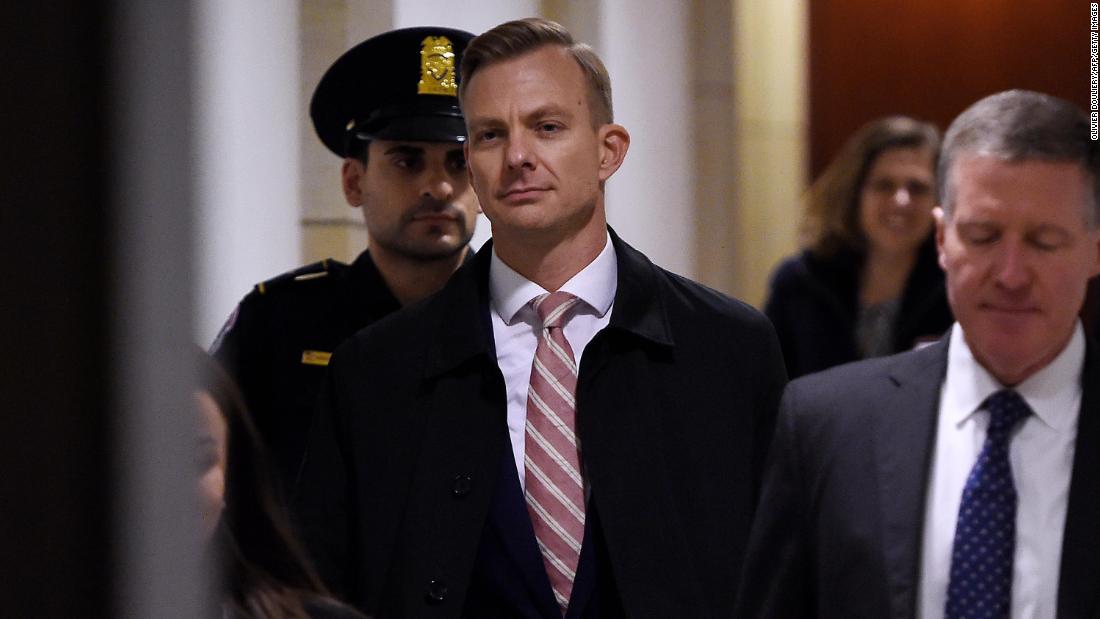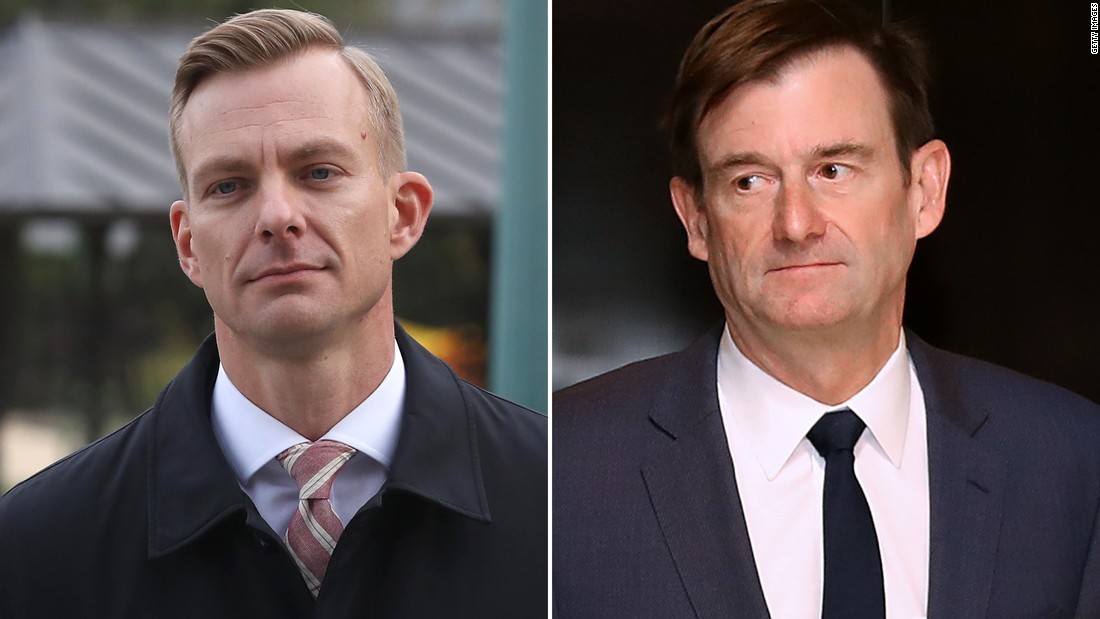[ad_1]

David Holmes, the political adviser at the embassy, said he was taken aback both by the conversation he overheard and the woeful lack of operational security demonstrated by Sondland, the US ambassador to the European Union.
“This was an extremely distinctive experience in my foreign service career,” Holmes said. “I’ve never seen anything like this, someone calling the President from a mobile phone at a restaurant, and then having a conversation of this level of candor, colorful language. There’s just so much about the call that was so remarkable that I remember it vividly.”
Holmes also provided lawmakers with more details about what happened after the US security aid money was released on September 11, saying there was a belief that Ukrainian President Volodymyr Zelensky was going to follow through with a CNN interview to announce the investigations once the money was unfrozen.
“We worried that the hold was lifted after Zelensky potentially gave a commitment to do the interview,” Holmes said.
“So you were concerned that Zelensky had already made the commitment in order to get the aid, get the meeting,” asked House Intelligence Chairman Adam Schiff, a Democrat from California.
“Yes,” Holmes responded.
Holmes also heard Sondland tell Trump that Zelensky “loves your ass” and that the Ukraine President would do “anything you ask him to.”
In his deposition, Holmes said Sondland later told him at the restaurant that Trump “doesn’t give a s–t about Ukraine,” and that his primary focus was on “big stuff that matters to him, like this Biden investigation that Giuliani is pushing.”
Rudy Giuliani, an attorney for Trump, told CNN in September that he had asked Ukraine to investigate former Vice President Joe Biden.
The episode with Sondland surprised Holmes because of the high likelihood the phone conversation could have been monitored by foreign intelligence.
“It was surprising to me that he — yes. In my experience, generally, phone calls with the President are very sensitive and handled accordingly,” he said. “I believe at least two of the three, if not all three of the mobile networks are owned by Russian companies, or have significant stakes in those.”
“We generally assume that mobile communications in Ukraine are being monitored,” Holmes said.
Hale, in his testimony earlier this month, said he never heard about the investigations into the Bidens, Burisma and the 2016 election “in the government channels.” Hale told House investigators he was not aware of what was being pursued in Ukraine and said he was surprised when he learned about it in the wake of the Trump-Zelensky call transcript release.
“It was not something that was apparent to me,” Hale said.
Hale’s testimony did include new nuggets, including confirmation that Secretary of State Mike Pompeo spoke to both Giuliani and Fox News’ Sean Hannity about the attacks on former US Ambassador to Ukraine Marie Yovanovitch.
Holmes adds details on fallout of phone call
Holmes’ surprise deposition last week provided new details on the fallout in the US embassy in Kiev. He said he referred to the call as a “touchstone piece of information” to explain why Zelensky couldn’t get a meeting with Trump.
“I would refer back to it repeatedly in our, you know, morning staff meetings,” he said. “We’d talk about what we’re trying to do. We’re trying to achieve this, that. Maybe it will convince the President to have the meeting. And I would say, ‘Well, as we know, he doesn’t really care about Ukraine. He cares about some other things.'”
Holmes explained how he was able to overhear the call, explaining that Sondland placed the call through a switchboard, and appeared impatient as he waited for Trump to get on the line. When he did, the volume was so excessive that Sondland appeared in pain.
Sondland “winced and then moved the phone away from his ear, because the volume was loud,” Holmes recalled in his testimony.
He said eventually the wincing ceased.
“He stopped doing that. I don’t know if he turned the volume down or got used to it or if the person, the President, I believe, on the other line moderated his volume,” Holmes said.
Bill Taylor, the top US diplomat in Ukraine, revealed the existence of the July 26 call between Trump and Sondland at his public testimony last week, when he said that Holmes reminded him of the call following his October deposition.
Asked if the Ukrainian government felt pressure to announce the investigations, Holmes testified that he believed the Ukrainians felt the heat and ultimately understood that there was a quid pro quo. “I think the Ukrainians gradually came to understand that they were being asked to do something in exchange for the meeting and the security assistance hold being lifted,” he said.
It is unclear to which period of time Holmes is referring.
Holmes told lawmakers there was no “new reason to open an investigation” into Burisma Holdings, a Ukrainian natural gas company that Hunter Biden once sat on the board of.
“So of the universe of possible investigations of anti-corruption related offenses and whatnot, that wasn’t one we were focused on, because there was not anything new to that issue in our time there, it was from something that happened before,” he said.
Holmes said he briefed the embassy staff as well as Taylor when he returned from a vacation shortly after the call — and that he mentioned the “extraordinary” call to some of the six friends he was with during the trip, though he said he did not go into detail.
“I met with up with a number of friends of mine for a trip, and I do recall telling them that I was just part of this lunch where someone called the President, and it was, like, a really extraordinary thing, it doesn’t happen very often,” Holmes said. “I didn’t go into any level of detail because they don’t know this stuff.”
Rep. Jim Jordan, an Ohio Republican, seized on that, and pressed Holmes with a followup question: “You told friends you were sitting by an ambassador who was talking on his cell phone with the President of the United States, you told your buddies about that?”
Holmes also told lawmakers that Energy Secretary Rick Perry’s staff “was very aggressive in terms of promoting an agenda and excluding Embassy personnel from meetings without giving explanations.”
The testimony paints a picture of the parallel type of diplomacy other witnesses have described in Ukraine, this time with a focus on Perry, who is one of the self-styled “three amigos,” along with Sondland, who were helping execute the untraditional campaign.
‘Leaning into the other channel too far’
Hale, the undersecretary of state for political affairs, was the highest ranking State Department official to testify in the House’s closed-door impeachment inquiry depositions when he appeared earlier this month.
He said there was a concern that Volker was “leaning into the other channel too far,” a reference to the Ukraine policy spearheaded by Giuliani.
“It was my impression that Ambassador Volker was trying to minimize — was trying to manage things, was trying to get the Ukrainians what he felt they needed and while navigating Washington politics essentially,” Hale said. “And it was at the point when he arranged the meeting or played a role in arranging the meeting for (Ukraine political aide) Mr. Yermak that I felt that he was leaning in perhaps too far in that, leaning into the other channel too far.”
And Hale says the State Department did not recommend Sondland be included among those who attended Zelensky’s inauguration, saying the recommendations were to include officials in the normal line of authority for Ukraine policy, like Volker. He learned Sondland was going when the White House released the delegation list, Hale said.
Hale met Sondland “a few times,” he set, describing him as a man who bragged about his access.
“He definitely wanted people to know that he had direct access to the President, and he would often invoke the President’s name for certain things he wanted and he was pursuing,” Hale said.
Hale also added more detail on what went on inside the State Department amid the attacks against Yovanovitch coming from Giuliani and conservative media figures. According to Hale, Pompeo spoke to Fox News host Sean Hannity regarding their promotion of “the narrative” about Yovanovitch.
“It did come up at some point with the secretary. I understood that he did call Sean Hannity,” Hale said.
Asked what Pompeo told Hannity, Hale said, “What the secretary had consistently been saying, which is: If there are these allegations, I need to see what the evidence is.”
“The secretary’s takeaway from the conversation was that there was no evidence that was credible about — to support these allegations,” Hale added.
Hale said that in the course of reviewing documentation, he saw that Pompeo spoke with Giuliani twice — once on March 28 and again on March 29, but he did not know what they spoke about, only that it happened as Pompeo was pushing back at the anti-Yovanovitch narrative.
Ultimately, the State Department did not issue a public statement of support for Yovanovitch when she was removed, which she spoke about in her public hearing last week.
Hale said that the President’s attack on the ambassador in the July 25 call concerned him, in which Trump said Yovanovitch was going to “go through some things.”
“It concerned me. I was not aware that was anything that was happening in consequence of that,” he told House investigators. “That was not an operational comment that had been operationalized in any way.”
Hale said that the resignation last month of Mike McKinley, who was a senior adviser to Pompeo, surprised him. McKinley in his testimony said he resigned in part because of the failure of State Department leaders to speak up for Yovanovitch, and Hale said he spoke with Pompeo about the potential damage to State Department morale.
“I had a conversation with the secretary of state about it, and I mentioned to him that Mike (McKinley) seemed to me to be worked into a very negative state of mind, based on one of the meetings I had and the one in which he said that he had submitted his resignation,” Hale said. “And I said that it could be creating a problem — for the morale of everyone — you know, all those around him.”
Hale said Pompeo “didn’t really react to” his comments.
This story has been updated with additional developments Monday.
CNN’s Clare Foran, Nikki Carvajal, Maegan Vazquez and Mashall Cohen contributed to this report.
[ad_2]
Source link

